Want to vacation in beautiful Costa Rica? Read our blog story titled
“Why Costa Rica Should Be On Your Retirement Travel Bucket List.”
More North Americans are choosing to retire abroad, and one of the most popular spots is Costa Rica, in nearby Central America. In the latest annual survey by International Living, Costa Rica ranked No. 3 in a list of the top 20 countries in the world for retiring abroad, following Panama and Portugal.
According to the U.S. Social Security Administration, more than half a million U.S. citizens receive Social Security checks outside the United States. By some estimates, as many as 70,000 North Americans live in Costa Rica, and many more go there as winter snowbirds or frequent tourists.
Few North Americans know Costa Rica as well as Paul and Gloria Yeatman, authors of the popular blog, Retire for Less in Costa Rica. They retired in 2009, moving from Baltimore, Maryland, to San Ramon de Alajuela, a small town in Costa Rica’s beautiful Central Valley. Since that time, they have conducted more than 300 tours for North Americans and Europeans considering retiring to Costa Rica. Gloria has written a book, Cooking in Costa Rica, that is available on Amazon. They are currently working on a second book.
This Retirement Life had the pleasure recently of talking with Paul and Gloria. Their comments will be invaluable to anyone considering retiring to Costa Rica or who just wants to know more about this unique and exotic country. Here are excerpts from that interview:
Q: Why are so many U.S. and Canadian retirees moving to places like Costa Rica?
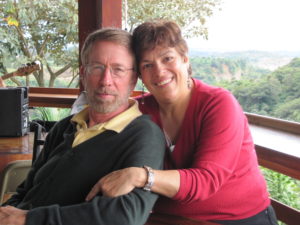 Gloria: People come for a variety of reasons. For us, we wanted something different, we wanted to have a different life and do a little bit of exploring. Sometimes people come here because they are looking to live a higher level of life for less money and they think they can do it in Costa Rica or some other place. Usually those people get pulled into the idea of living in paradise for very little money. (On our tours) we never talk about paradise, other than to say there is no place that is 100 percent paradise.
Gloria: People come for a variety of reasons. For us, we wanted something different, we wanted to have a different life and do a little bit of exploring. Sometimes people come here because they are looking to live a higher level of life for less money and they think they can do it in Costa Rica or some other place. Usually those people get pulled into the idea of living in paradise for very little money. (On our tours) we never talk about paradise, other than to say there is no place that is 100 percent paradise.
Paul: We don’t mention it (paradise). We consider it a disingenuous term, kind of a real estate sucker term. No place is paradise. It’s what you make it.
Gloria: A lot of people are just tired of the cold. A lot of Canadians are here, and people from Minnesota, New York, and of course a lot of Southerners too. We have people here from Texas and Florida. They come from all over.
Q: Should you retire to Costa Rica because it’s cheaper than living as a retiree in the U.S. or Canada?
Paul: We tell people on our tours if that (cost of living) is the main reason they are coming here, they probably won’t make it. You have to have a sense of adventure and an interest in other cultures. This idea of coming here just because it’s cheaper may not be the best idea. I look at it (lower cost of living) as a bonus.
Gloria: Not being able to afford to live in the (United) States is a reality for a lot of people, and healthcare is a big part of that. If you have enough to qualify for legal residency, then you have to join the public healthcare system, which is referred to as Caja. There are no pre-existing conditions and there’s no age limit. What you pay is based on the income you used to qualify for residency, typically $75 to $100 per month for a retired expat couple. (Note: Costa Rica requires at least $1,000 in monthly income from sources such as Social Security or pensions in order to qualify for residency).
Paul: Some expats choose to keep their Medicare plans and go back to the States for healthcare, but it’s more because they are familiar and comfortable with that healthcare system back home.
Q: Healthcare is a concern for retirees. How is the quality and availability of healthcare in Costa Rica?
Gloria: When you look at the mix of public and private options, we’re extremely pleased with the healthcare.
Paul: We’ve had two surgeries here, both in the state (public) system. She had an outpatient surgery, a pretty serious one because they thought it might be cancer, and I had my right kidney taken out. I was in the hospital for 13 days.
Q: Why did you to choose to live in the Central Valley?
Paul: We’re at a higher elevation, around 3,500 feet above sea level, so the climate is moderate, year-round. We have no need for air conditioning or heat, which keeps our costs down. In Baltimore, our utility bills were sometimes as high as $350 a month. Hospitals and shopping in the capital city of San Jose are just over an hour away, and the beach is only an hour’s drive.
Q: Did you select San Ramon because it’s a haven for expats?
Paul: No, that wasn’t a factor for us. It’s a small town with only about 400 expats. Our neighbors are mostly Ticos (a term for Costa Ricans). We can go all day in town without seeing another North American.
Q: Where are some popular spots in Costa Rica for North Americans looking to retire there?
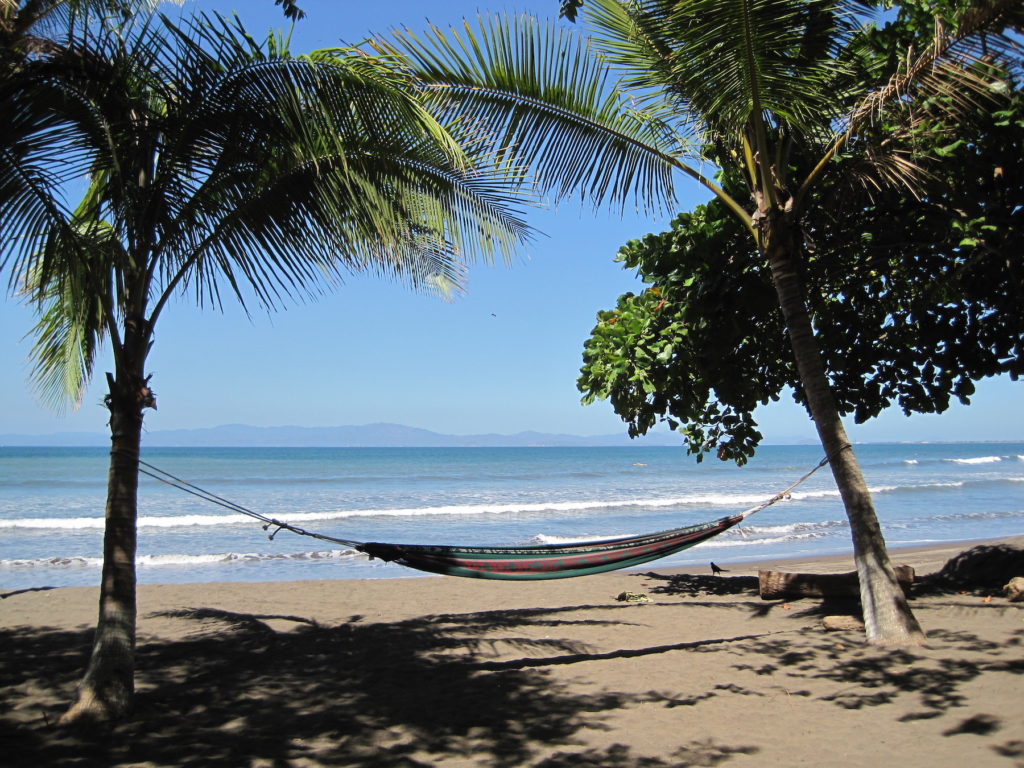
Gloria: San Ramon, Grecia and Atenas are all popular towns in the Western Central Valley, but Atenas is Number One.
Paul: Escazu is even larger, and then there’s Santa Ana. Both of these places are closer to San Jose, almost like suburbs.
Gloria: Another place that is really popular, without having to go to the beach, is Lake Arenal. It’s a beautiful lake, with a lot of pockets of expats living around it.
Paul: And then you’ve got the coast, mostly the Pacfic coast, but there are some on the Caribbean coast too. On the Pacific side alone, you have about 1,000 miles of coastline.
Gloria: It’s a different feeling out there (on the coast), and more expensive, especially with air conditioning costs.
Paul: The Caribbean coast has always had a kind of hippie vibe, whereas some people say that the Pacific coast is a more yuppie vibe.
Q: Many North Americans want to live on the beach. What are some of the more popular beach towns for expats?
Paul: On the Guanacaste coast, there’s Playa Hermosa, Playa del Coco, and Playa Flamingo. Further south, on the Nicoya Penisula, are Nosara, Samara, and Montezuma.
Q: Florida is the most popular domestic spot for U.S. retirees. It shares many characteristics with Costa Rica, such as pretty beaches and warm weather. Why should retirees leave the country when they could just retire to Florida?
Paul: It’s a lot more expensive (in Florida) and there’s not as much adventure.
Gloria: Florida is pretty flat. I like being in the mountains. I like the way they look, and I like the climate better. For us, Florida year-round would just be too hot and humid. Plus, when you live overseas, it broadens your perspective of the world, and moving to another state in the U.S. doesn’t do that. Living in another country gets you out of your fishbowl. It helps put things in perspective.
Q: Whether we’re talking about Florida or Costa Rica, lots of retirees move there, find out it’s not for them, and then move back. Why do North Americans leave Costa Rica?
Gloria: The number one reason people go back is for family – kids, grandkids, and parents who are elderly. The second reason is for medical stuff. They don’t speak enough Spanish to feel comfortable using the socialized medical system here, or they have a health condition that can’t be treated here. You’re talking a small country, the size of West Virginia. They do most things well, but there there are some things they just can’t do here.
Paul: Most (medical) things they can do here. 99.5 percent, they do great.
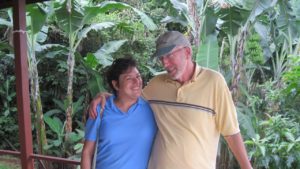 Q: What advice do you have for North Americans or Europeans who want to consider Costa Rica for their retirement?
Q: What advice do you have for North Americans or Europeans who want to consider Costa Rica for their retirement?
Paul: The longer they can come down here on a trial basis, the better. If you can come down for a month, fine. If you can come down for six months, that’s better. If after six months you decide this isn’t for you, you’ve saved yourself a ton of money.
Paul: We also recommend they take our tour. If they really want to know Costa Rica, we can save them a lot of time and money, and show them the possibilities. We do not promote Costa Rica. I tell people real quickly that I don’t care where they retire. We’re just going to give you the information. You can go to Panama or Ecuador or stay in the States. I just want to give you the information and let the chips fall where they may.
Q: Many people move to a new place like Costa Rica and immediately buy real estate. What is your advice?
Paul: We don’t even show them real estate on our tours. We recommend they rent, at least for the first year, until they get to know the country and see if they like it. Living somewhere is different from vacationing there. It’s the dream versus the reality; the expectations versus the reality. We are the voice of common sense. We’re going to show them the good, the bad and the ugly.
Q: You’ve now lived in Costa Rica for more than a decade. Any regrets? Would you do it again?
Gloria: Would I do it all over again? In a minute. I have no regrets for doing what we did, leaving the U.S. We weren’t running from the U.S.; we were going to a new experience.
Paul: At the end of the day, I love it. I love the whole international life. It’s so much fun; it’s so interesting. I’m living my dream, and I’m thrilled with it.
You can learn more about Paul and Gloria’s experiences in Costa Rica and the tours they offer on their blog, Retire for Less in Costa Rica.
Want to vacation in beautiful Costa Rica? Read our blog story titled
“Why Costa Rica Should Be On Your Retirement Travel Bucket List.”
Got comments? We love to hear from our readers! Please scroll down and add your comments in the section below. Just remember to keep it clean; this is a “PG” rated blog. We also do not approve of comments that are selling a brand, product or service.
Like this story? Subscribe via email for free to receive all future stories from This Retirement Life. Our blog explores topics of interest to retirees and those planning for retirement. Please see subscription information to the right of this story or below, and sign up today.
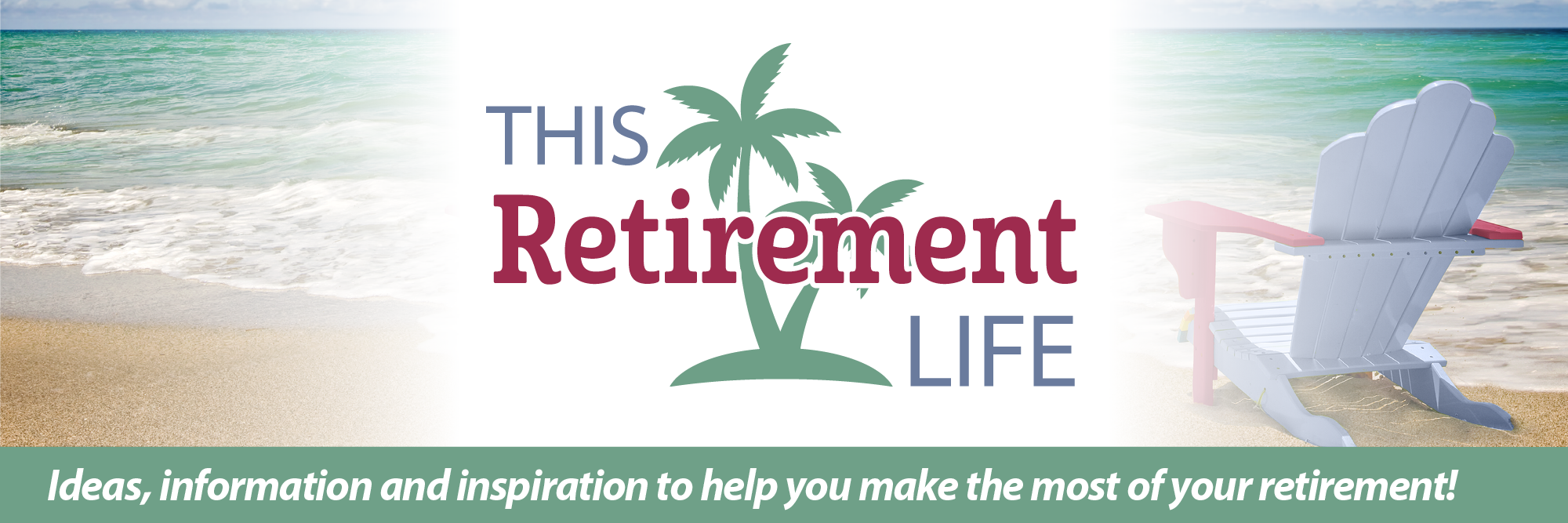
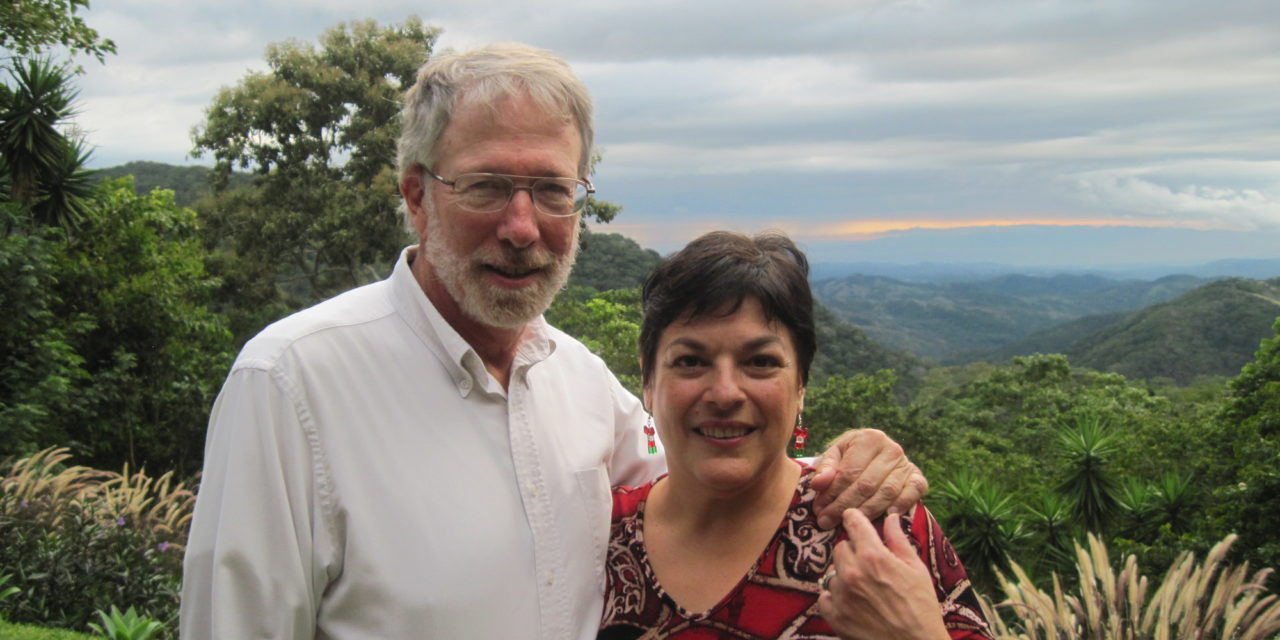







We’ve lived in CR 40+ years and l must say what you share about the experience of living here and your recommendations are spot on. Take note readers.
Thanks for taking time to comment. Costa Rica is a beautiful country!
You asked many questions except the one I am interested in. What’s it like for s single female expat in her 60s to live there?
Thanks for your question, Micahla. I do not have the expertise to answer your question well, but I can offer a few observations that may prove helpful. First, the Costa Rican people (Ticos) are known as a friendly and welcoming people, who enjoy getting to know expats. Second, you may be happier settling in a town or region with plenty of other expats, if that’s important to you, so you can more quickly have a “community” around you and make new friends. San Jose and some of its suburbs, like Escazú, are more urban and have large groups of expats. Pacific beach communities like Tamarindo and further south along Dominical and Uvita are popular with expats, as are some of the smaller Highlands towns such as Atenas. Third, if you haven’t done so already, consider taking an exploratory trip to Costa Rica to visit some of these communities and talk with other expats. There are guides and consultants you can work with who specialize in helping expats. Best wishes to you on your adventures!
I’m 68 and hoping to move to Grecia area when I’m 71. In Facebook Groups I found Grecia Expats Q%A and it was so helpful. They have a lunch at 12:00 each Wednesday for town newbies at a beautiful restaurant, Los Jardines Vivero & Cafe. I found that group so helpful.
I’ve also found a couple of Airbnb’s which are bedroom/bath in single women’s homes. That’s where I plan to start for looking for a long-term rental house or apartment.
Our big concern is all the paperwork and details from banking to moving is overwhelming. It would be nice if there was a business that helps you in detail from buying a home to setting up your banking to moving in that is lawyer based so we can feel comfortable about the move. Maybe such an organization exists ??
Hi. My husband and I are taking our first trip to Costa Rica in February. One major reason is to start our search for places to spend the winter months once we retire. Any advice??
I hope you both enjoy Costa Rica. It’s a beautiful country and the people are friendly.
One of the challenges is deciding which region you like best. North Americans tend to settle in one of several areas, including the suburbs north of San Jose (urban services, shopping malls, excellent healthcare, airport nearby), the Highlands such as La Fortuna or near Lake Arenal (cooler climate, great natural beauty, but more remote), the Guanacaste/Pacific Coast region such as near Tamarindo (drier, less humid than other coastal areas; nice beaches, accessible from Liberia airport), or the Pacific beach towns further south such as Jaco (easy access to San Jose, more tropical, pretty beaches, but most humid). Regardless, I would recommend renting, not buying, at least your first season in any foreign country. Finally, and if you are experienced international travelers this won’t be a surprise, but don’t expect Costa Rica to be like the U.S. or Canada. While it’s a relatively modern and advanced country, it’s still Central America. You have to enjoy it for what it is, and millions of expats and snowbirds do so.
I’d love to hear back from you on how your trip goes. Best wishes and “Pura Vida”!
where is a Canadian community located; On our 3rd weeklong vacation- to get the “feel of living there “ we purchased a lot, on which we intend to build ( container house) onPortrero Rd,GUANACASTE; how do retirees (we”re in our early 60’s) spend the day; the previous 2 vacations we did the “tourist things” so there’s not much to explore- just Relax😊
Hubby could spend hours on the beach🙄 but I enjoy Adventure : hiking, exploring- enrichment
Also do you have any idea of the current value of the above property in Surfside)
I retired from California to the Florida countryside in Citrus Countryside in the Spring of 2021. After a year and a half, I know that where I live and Florida in general is not where I want to be. So I’m following up on my interest in living abroad. Costa Rica has been on my radar for many years. There along with other countries such as Portugal and Panama. Unfortunately most information about retirement in general seems to be geared to couples. I’m 64, single and still very active as a long time ultra distance runner. So most of the information I see is not directed to people like me. I do like your approach of presenting Costa Rica in an objective way and would be interested in learning more about your tours.
Thanks for your question, Ted. You are looking at some of the most popular countries for ex-pat retirees. I’m sure it is frustrating at times as a single person living in a couples-centric world. For what it’s worth, the bus tour we took of Costa Rica had several singles, and I think (hope) us couples on the tour welcomed them and didn’t exclude them. There are more singles than ever these days, which should work to your benefit in finding other people to socialize with. As I mentioned in response to another comment, if you’re looking for towns to retire to in Costa Rica, it may make sense as a single person to gravitate toward places with a lot of ex-pats, presumably including some singles. As for tours, we used Caravan Tours, one of the larger and older operators in Costa Rica. We were quite pleased with the experience. Best wishes to you on finding your perfect paradise!
What is the maximum monthly contribution for La Caja? A lawyer told us it would be about 20% of the social security pension. Is this correct? Another question is: Do you have to live in a gated community?
Sorry, Marc, but I’m not qualified to answer your question about Costa Rica’s La Caja healthcare system. As for where to live, there are plenty of options for expats in Costa Rica. You’t don’t have to live in a gated community. Some expats choose condos in a beach town while others prefer living in smaller towns in authentic Costa Rican homes. Best wishes on your adventures!